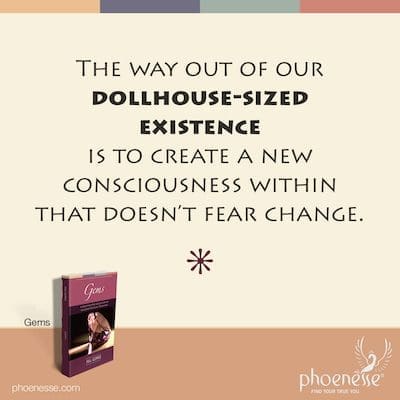There is a movement happening, regarding every single organism in the universe. And that movement is in the general direction of expansion. There is actually the seed of a plan buried in the heart of all divine substance, and the designs call for continual growth—for expansion—to infiltrate all that is.
Contained in this motion are limitless possibilities for expressing, creating and being. How many ways can we possibly be joyous and ecstatic and wise? The answer is so big, we can’t frame it in human language. And when the expansion music stops, we fall on the floor and break. Or to be less dramatic, there will be a temporary break in our consciousness-and-energy continuum.
An example of this is death. Although, perhaps that sounds more dramatic. But in truth, death is nothing more than a break. On another level, our consciousness and energy pick up the beat and resume, as it were. It’s like the way sleep is a break in consciousness on this level, but we journey on, on another level. This notion of a break is an illusion—although it seems real enough to us from where we sit.
Implied in the movement of expansion is the willingness to change. Or perhaps we’re more familiar with the countermovement we feel in our soul—the fear of change. This is at odds with the natural movement of expansion, which is what needs to happen if we are to express ourselves in the world.
A fuller self-expression then equates with change. Said the other way around, if we don’t change, we can have no self-expression. This is how we tie our own hands within the scales of justice.
Let’s look at this on the physical level. Any kind of organism goes through phases of growth that may at first be so subtle they’re hard to notice. Cumulatively over time, though, they’re impossible to miss—like an infant growing into childhood, and onto adolescence, and eventually into full adulthood. The organs, the body, the appearance—the whole physical being—morphs from infancy to old age. Then it morphs further beyond what humans can see happening.
If we hindered the cycles of change along the way, by somehow constricting space for physical expansion, atrophy and finally death would occur. We would destroy life. The unseen aspects of an organism—the psychic, spiritual, mental and emotional levels—are no different. Yet humans carry with them a mass image—or a collective hidden belief—that says we should fear change.
This fear of expanding in our inner beings has a similar effect to a physical restriction. It prevents the natural movement of our soul by creating a narrow space we must wedge our psyche into. The notion perpetuated by this widespread belief is that there is security in not changing. This is not a trivial thing, for this very belief is responsible for the creation of death. After all, our life experience is molded by our convictions.
But humans tend to look at things in reverse. We think of some phenomenon as being inevitable, and then we consider its cause to be the effect. Case in point, we see death as an inevitable fact of life that is an unknown. And we conclude that our fear of death stems from its unknown status. In reality, our fear of death comes from believing that change leads us into the unknown—which is something to be feared—and therefore we should fear change.
If we are afraid of change, we will atrophy the spiritual muscle we need to develop in order to expand. We will box ourselves into a nonmoving state and scarcely breathe in an effort to thwart change. That explains, in a nutshell, the human condition.
The way out of our dollhouse-sized existence is to create a new consciousness within that doesn’t fear change—that trusts change as a natural and desirable way to live. We must uncover the blind reaction inside that believes we’re safe if we don’t move. In truth, it’s just the opposite. We’re only safe when we trust in life and its natural propensity for change.
It’s going to take some deliberate thinking to turn the tide on this. We must come to see that change is both a desirable and joyful movement that leads to ever-more joyous experiences. We need to imprint this truth on our soul substance. Then we will no longer halt the natural movement of our whole being that wants to flow in the direction of unity.
The illusion of time is a side effect of the ongoing movement of everything that is alive. Time also arises out of the misguided belief that we should avoid the future and cling to the past if we hope to go on existing. All of humankind is tripped up by this false idea. It takes courage and faith to challenge this belief.
It’s odd, in fact, how much courage it requires to take the apparent risk of believing in something new and positive. But this is what must happen if we want to follow the flowing movement of life. We must go out on a limb and gain trust that when something seems mysterious—simply because it is an unknown—that doesn’t mean it’s a threat.
Imagine what it would be like to live without any fear of death. For the God-expressing person who is highly developed and mostly conscious, having no fear of death would equate to unending joy. We would go forth with all our divine potential on full display. But if we’re still half-asleep, having no fear of death might make us lazier than we already are, and less motivated to find our way out of the illusion we’re lost in.
Don’t take this the wrong way: We are not given a fear of death in order to manipulate us into taking some initiative. In truth, our fear of death is something we ourselves create through our fear of moving and changing. But thanks to the sweet way that divine laws operate, our fear of death can then become the medicine that cures what ails us. We then become a self-healer.
Grasping this concept is a doorway to sensing the benign nature of all creation. It’s a remarkable example of how any evil we create, intentionally or not, can be the very agent we can use to heal the evil. This is true for any suffering, fear or negativity—and all other self-produced errors. If we want to, we can use them as the means for drawing ourselves out of these unpleasant states.
In this particular case, we need to overcome our distrust of change, growing out of this tendency to stop ourselves from changing and expanding. That’s the avenue for discovering the world’s not such a bad place after all: It is intensely desirable, trustworthy and secure.
Behind the so-called curtain of death, we’ll sense there is nothing to fear, even if it remains unknown. All our life experiences that lay in an unknown future will then be felt as joyous in the present. To achieve this, we need to learn to live—with relaxed confidence—in a state of not knowing. In this way, whatever we feared would happen tomorrow, will turn into a joyous today. Accordingly, we’ll now trust in an unknown future.
As we grow spiritually and become more whole, we’ll organically lose our fear of change. We’ll start to visualize change as the most desirable state possible. We may not know what tomorrow will bring, but we will know a trusting attitude towards a new and different day that is more alive and more fascinating.
Even though we still won’t know what tomorrow holds, we won’t feel threatened by it. We will intuitively realize the true nature of God, and we won’t block the change that is waiting to manifest God through us—in the cells of our body as well as in our psychic substance.
We need to stop halting the movement of our soul—the expression of ourselves out into life, which is totally trustworthy. We need to have confidence in our own unfolding. It can only lead to good as long as we visualize change as being for the better. Of course, if we plan for the worst, visualizing change as being bad, what we will bring about will be the worst.
When we can fully welcome change, we will begin to overcome death. This is true in both the sense of no longer fearing the unknown of death, but also, in certain cases, in actually transcending the need to die. In these teachings, reincarnation is often discussed and even taken for granted. And while discussion about past or future lives generally yields little that is practical or helpful, there is an interesting phenomenon that may be helpful for some people to understand: reincarnation within the current lifespan.
For a person who follows a rigorous path of accelerated development, such as we are shown by way of these teachings, it frequently happens that one can reincarnate without leaving the body. Here’s how this comes about. We each made plans for our life task—working of course with our spiritual advisors—before we incarnated. But many people leave their Earth visit before making much headway. This results in an unfortunate need for a repeat experience, under somewhat different conditions.
But sometimes things go quite another way, when we fulfill our task and are ready to take on more, which would normally await a subsequent embodiment. When this happens, we can choose—while meeting with our spiritual advisors during sleep—to keep going. We can bypass the laborious process of breaking our consciousness—of dying and being reborn—if we are truly devoted to giving our all to our own expansion and taking on whatever was next up in our queue. We can be reborn within the same lifespan.
It is rather rare that someone embraces their spiritual path in such an intense way. But it does happen. And if this reincarnation-without-leaving-the-body process does occur, it creates a wonderful change. The organic movement is accelerated.
During this period in time, at the turn of the century, when we are experiencing a great energetic influx of Christ consciousness, more individuals are opening themselves to this possibility. If we trust it and don’t shrink from it, we can bring about a second incarnation in a single life.
In our meditation, we can visualize change as being the most brilliant, joyful phenomenon. We can flow with this tide and not resist it. We can also challenge the notion that it is safer to stay with the familiar. Sometimes, familiar territory may actually be less safe. Yet we confine ourselves to the four walls of what we know. Our goal though, is to move beyond what currently exists, and make new territory our familiar ground. Soon we will feel as comfortable as we did in the old.
To fully realize ourselves is to feel comfortable in our own skin as we step into new self-expression. If we boil it down, that’s always our task. It’s only the first few awkward steps of a new experience that land with the unease of the unfamiliar.
But once we expand our comfort zone, we again move more fully into life. Over time, all states of consciousness will become truly our own, and we will find ourselves “at home” wherever we go. Then we will be one with all that is.
Return to Gems Contents




